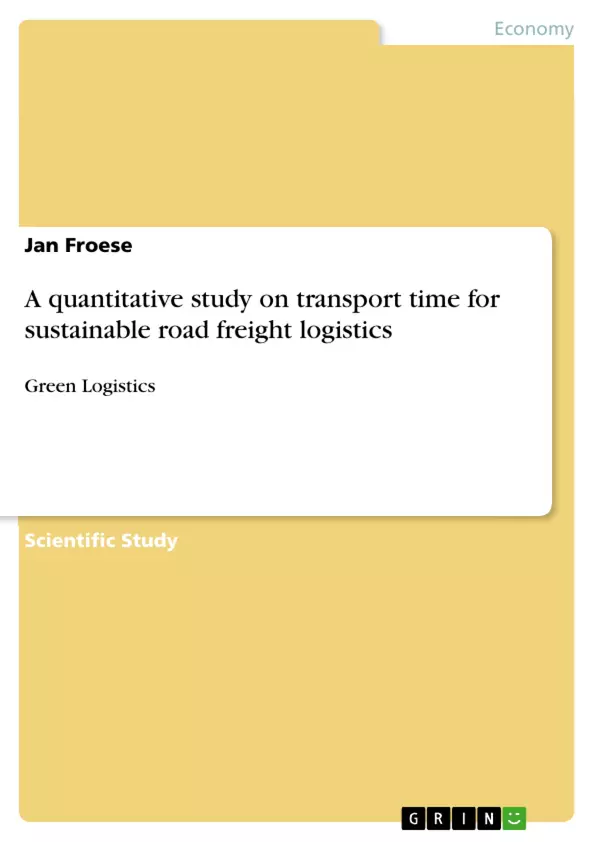Referring to the Institute for Energy and Environmental Research (IFEU), road freight transport will increase by 80% between 2004 and 2025. In order to reduce the negative environmental effects freight transport needs to be arranged more sustainably in future. Although rail and water transport is less climate-damaging than road freight, companies hesitate to relocate road freight transport to more environmentally friendly modes because these are slower. But at the moment it is not proven to what extent the majority of customers actually require the fastest possible delivery for their orders. In case longer transport times are accepted in the market, rail and water logistics would be an attractive and sustainable alternative. In this contribution more than 5000 freight transport orders handled in continental Europe have been analyzed in terms of time constraints given by the customers. It can be concluded that there is a significant amount of road transport which could be handled in a slower and more sustainable way. To do so, it is crucial that future transport management systems are able to identify non time-critical orders and support a modal shift.
Inhaltsverzeichnis (Table of Contents)
- Introduction
- Literature research
- Study
- Results
- Outlook
Zielsetzung und Themenschwerpunkte (Objectives and Key Themes)
The objective of this study is to analyze the time constraints of road freight transport orders in continental Europe, determining the percentage of shipments that are time-critical and could therefore be considered for slower, more sustainable transport modes like rail or water.
- The increasing environmental impact of road freight transport.
- The potential of rail and water transport for reducing environmental impact.
- The impact of transport time on the adoption of sustainable transport modes.
- The analysis of time-criticality in road freight transport orders.
- The feasibility of shifting non-time-critical road freight to more sustainable modes.
Zusammenfassung der Kapitel (Chapter Summaries)
- Introduction: The chapter outlines the increasing volume of road freight transport and its associated environmental impact. It highlights the potential of rail and water transport for reducing these impacts, but notes the reluctance of companies to shift due to perceived longer transport times. The chapter introduces the study's aim to analyze the time constraints of road freight transport orders and determine the percentage of shipments suitable for slower modes.
- Literature research: This chapter presents a review of existing research on the role of time in logistics and the potential for a shift towards sustainable transport modes. It highlights the importance of time in logistics and the paradox that more efficient transport leads to greater freight volume. The chapter also emphasizes the need for a sustainable modal shift and the potential for reducing greenhouse gas emissions by shifting from road to rail.
- Study: This chapter details the methodology employed in the study, which involved analyzing over 5,000 transport orders handled in continental Europe between November 2012 and January 2013. The study focused on identifying the lead times faced by logistics providers, the percentage of time-definite and time-critical orders, and the percentage of transports suitable for slower modes while still meeting customer time constraints. It provides information on the geographical scope of the study, the data sources used, and the steps taken to ensure data quality.
- Results: This chapter presents the key findings of the study, demonstrating that a significant proportion of road freight transport orders are not time-critical and could potentially be shifted to slower, more sustainable transport modes without compromising customer requirements. The chapter also discusses the correlation between distance, transport weight, and buffer time, highlighting that there is no strong relationship between these factors.
Schlüsselwörter (Keywords)
The key focus of this research is on sustainable road freight logistics, time-criticality, and the potential for a modal shift. The study utilizes empirical data to analyze the time constraints of transport orders, providing insights into the feasibility of adopting more sustainable transport modes like rail and water transport. Other keywords include: greenhouse gas emissions, environmental impact, transport time, and logistics.
Frequently Asked Questions
Why is road freight transport considered unsustainable?
It has a high environmental impact and is expected to increase significantly, contributing to rising greenhouse gas emissions.
Is rail transport a viable alternative to road freight?
Yes, rail and water transport are less climate-damaging, although they are often perceived as being too slow for modern logistics requirements.
Are most road freight orders actually time-critical?
The study of over 5,000 orders shows that a significant portion of road transport is NOT time-critical and could be handled via slower, more sustainable modes.
What prevents companies from switching to rail?
A primary barrier is the perception that customers always require the fastest possible delivery, even when there is significant buffer time.
How can logistics management support a modal shift?
Future systems must be able to identify non-time-critical orders automatically to facilitate a shift from road to rail or water.
- Citation du texte
- Diplom-Betriebswirt Jan Froese (Auteur), 2013, A quantitative study on transport time for sustainable road freight logistics, Munich, GRIN Verlag, https://www.grin.com/document/276520



